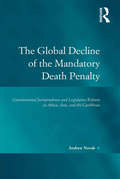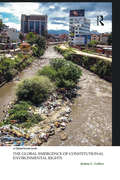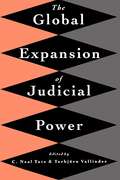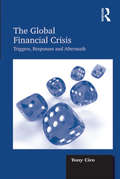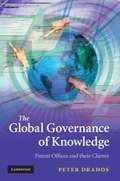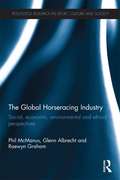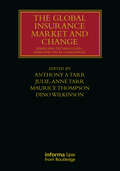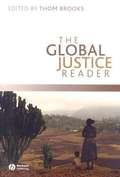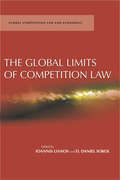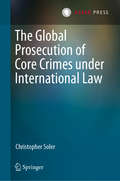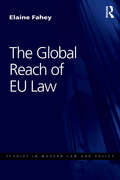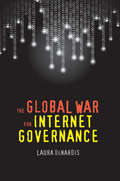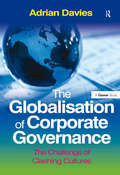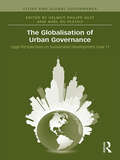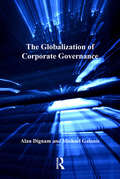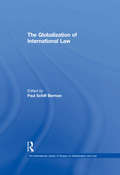- Table View
- List View
The Global Decline of the Mandatory Death Penalty: Constitutional Jurisprudence and Legislative Reform in Africa, Asia, and the Caribbean (Law, Justice and Power)
by Andrew NovakHistorically, at English common law, the death penalty was mandatory for the crime of murder and other violent felonies. Over the last three decades, however, many former British colonies have reformed their capital punishment regimes to permit judicial sentencing discretion, including consideration of mitigating factors. Applying a comparative analysis to the law of capital punishment, Novak examines the constitutional jurisprudence and resulting legislative reform in the Caribbean, Sub-Saharan Africa, and South and Southeast Asia, focusing on the rapid retreat of the mandatory death penalty in the Commonwealth over the last thirty years. The coordinated mandatory death penalty challenges - which have had the consequence of greatly reducing the world’s death row population - represent a case study of how a small group of lawyers can sponsor human rights litigation that incorporates international human rights law into domestic constitutional jurisprudence, ultimately harmonizing criminal justice regimes across borders. This book is essential reading for anyone interested in the study and development of human rights and capital punishment, as well as those exploring the contours of comparative criminal justice.
The Global Emergence of Constitutional Environmental Rights (Law, Justice and Ecology)
by Joshua C. GellersOver the past 40 years, countries throughout the world have similarly adopted human rights related to environmental governance and protection in national constitutions. Interestingly, these countries vary widely in terms of geography, politics, history, resources, and wealth. This raises the question: why do some countries have constitutional environmental rights while others do not? Bringing together theory from law, political science, and sociology, a global statistical analysis, and a comparative study of constitutional design in South Asia, Gellers presents a comprehensive response to this important question. Moving beyond normative debates and anecdotal developments in case law, as well as efforts to describe and categorize such rights around the world, this book provides a systematic analysis of the expansion of environmental rights using social science methods and theory. The resulting theoretical framework and empirical evidence offer new insights into how domestic and international factors interact during the constitution drafting process to produce new law that is both locally relevant and globally resonant. Scholars, practitioners, and students of law, political science, and sociology interested in understanding how institutions cope with complex problems like environmental degradation and human rights violations will find this book to be essential reading.
The Global Entrepreneur
by H. Laurence ShawFollowing the 2008 global financial crisis, entrepreneurship has never been more vital. As jobs were lost from large organizations, most new jobs came from innovative startups. The lure of hi-tech has attracted many people who see themselves as future entrepreneurs, but who lack the perspective of the total experience. To meet this demand, community colleges and universities across the world have set up entrepreneurship courses. The Global Entrepreneur is a life-changing book. To leave the comfort of a steady job and enter the tumultuous world of the entrepreneur is a major and often fearful step. For those who are contemplating this change, or who have already embarked upon this exciting venture, reassurance based on the experience of both successful and even not so successful entrepreneurs can be invaluable. The book provides an overview of the entrepreneurial experience broken down into all of its essential elements. Today, startups are global in nature and the book helps a budding entrepreneur understand the effect of different cultures both on the company and his/herself. This book differs from the existing literature in that its focus is on the individual and his or her reaction to the international nature of the entrepreneurial experience backed by both the lived experience of actual entrepreneurs and case studies of entrepreneurship across the world. Business success is measured by financial return. The book will be a vital tool in this endeavour. This book will appeal to students of business or management and individuals who are considering a career change, to create or join a startup, and need more knowledge to make their decision.
The Global Environment and International Law
by Joseph F. C. DimentoInternational law has become the key arena for protecting the global environment. Since the 1970s, literally hundreds of international treaties, protocols, conventions, and rules under customary law have been enacted to deal with such problems as global warming, biodiversity loss, and toxic pollution. Proponents of the legal approach to environmental protection have already achieved significant successes in such areas as saving endangered species, reducing pollution, and cleaning up whole regions, but skeptics point to ongoing environmental degradation to argue that international law is an ineffective tool for protecting the global environment.
The Global Evolution of Clinical Legal Education: More than a Method
by Wilson Richard J.Globally, the methodologies of legal education have not changed in any fundamental way, some methods dating back hundreds of years. Law schools have relied, for too long, on passive learning methods such as lectures or cases. Clinical legal education provides an alternative that is more than just another pedagogical method. It provides a way for students to experience their emerging professional selves, while providing services or projects with poor and underrepresented clients. This book documents both the historical origins of clinical experiments in the earliest days of US university legal education, and the now-global reach of clinical pedagogy as a proven tool for effective training of legal professionals.
The Global Expansion of Judicial Power
by Torbjorn Vallinder C Neal TateEssays examining the trend of expanding judicial powers in government around the world. In Russia, as the confrontation over the constitutional distribution of authority raged, Boris Yeltsin&’s economic program regularly wended its way in and out of the Constitutional Court until Yeltsin finally suspended that court in the aftermath of his clash with the hardline parliament. In Europe, French and German legislators and executives now routinely alter desired policies in response to or in anticipation of the pronouncements of constitutional courts. In Latin America and Africa, courts are—or will be—important participants in ongoing efforts to establish constitutional rules and policies protect new or fragile democracies from the threats of military intervention, ethnic conflict, and revolution. This global expansion of judicial power, or judicialization of politics is accompanied by an increasing domination of negotiating or decision-making arenas by quasi-judicial procedures. For better or for worse, the judicialization of politics has become one of the most significant trends of the end of the millennium. In this book, political scientists, legal scholars, and judges around the world trace the intellectual origins of this trend, describe its occurrence—or lack of occurrence—in specific nations, analyze the circumstances and conditions that promote or retard judicialization, and evaluate the phenomenon from a variety of intellectual and ideological perspectives.
The Global Financial Crisis: Triggers, Responses and Aftermath
by Tony CiroThis book offers commentary and analysis on the catastrophic events which have recently confronted the international economy in the modern era and contrasts the current situation with other financial crises. It includes case studies on Lehman Brothers in the US, Babcock & Brown in Australia, and Northern Rock in the UK. Asking many pertinent questions about the causes of the crisis and its effects, the book explores fundamental themes such as: asset bubbles and speculation in the financial and non-financial markets, systemic risks and the role of regulation, and regulators. It also reviews the response of international institutions such as the IMF, the World Bank, the US Federal Reserve, the EU Central Bank and the G20. The book assesses the triggers of the crisis and evaluates rescue packages and policy responses as well as suggesting reform of regulatory and supervisory frameworks to maintain banking and modern financial systems in the future.
The Global Flow of Information: Legal, Social, and Cultural Perspectives (Ex Machina: Law, Technology, and Society #5)
by Ramesh Subramanian Eddan KartzThe Internet has been integral to the globalization of a range of goods and production, from intellectual property and scientific research to political discourse and cultural symbols. Yet the ease with which it allows information to flow at a global level presents enormous regulatory challenges. Understanding if, when, and how the law should regulate online, international flows of information requires a firm grasp of past, present, and future patterns of information flow, and their political, economic, social, and cultural consequences.In The Global Flow of Information, specialists from law, economics, public policy, international studies, and other disciplines probe the issues that lie at the intersection of globalization, law, and technology, and pay particular attention to the wider contextual question of Internet regulation in a globalized world. While individual essays examine everything from the pharmaceutical industry to television to “information warfare” against suspected enemies of the state, all contributors address the fundamental question of whether or not the flow of information across national borders can be controlled, and what role the law should play in regulating global information flows.Contributors: Frederick M. Abbott, C. Edwin Baker, Jack M. Balkin, Dan L. Burk, Miguel Angel Centeno, Dorothy E. Denning, James Der Derian, Daniel W. Drezner, Jeremy M. Kaplan, Eddan Katz, Stanley N. Katz, Lawrence Liang, Eli Noam, John G. Palfrey, Jr., Victoria Reyes, and Ramesh Subramanian
The Global Governance of Knowledge
by Peter DrahosPatent offices around the world have granted millions of patents to multinational companies. Patent offices are rarely studied and yet they are crucial agents in the global knowledge economy. Based on a study of forty-five rich and poor countries that takes in the world's largest and smallest offices, Peter Drahos argues that patent offices have become part of a globally integrated private governance network, which serves the interests of multinational companies, and that the Trilateral Offices of Europe, the USA and Japan make developing country patent offices part of the network through the strategic fostering of technocratic trust. By analysing the obligations of patent offices under the patent social contract and drawing on a theory of nodal governance, the author proposes innovative approaches to patent office administration that would allow developed and developing countries to recapture the public spirit of the patent social contract.
The Global Guide to Animal Protection
by Archbishop Desmond Tutu Andrew LinzeyRaising awareness of human indifference and cruelty toward animals, The Global Guide to Animal Protection includes more than 180 introductory articles that survey the extent of worldwide human exploitation of animals from a variety of perspectives. In addition to entries on often disturbing examples of human cruelty toward animals, the book provides inspiring accounts of attempts by courageous individuals--including Jane Goodall, Shirley McGreal, Birute Mary Galdikas, Richard D. Ryder, and Roger Fouts--to challenge and change exploitative practices. As concern for animals and their welfare grows, this volume will be an indispensable aid to general readers, activists, scholars, and students interested in developing a keener awareness of cruelty to animals and considering avenues for reform. Also included is a special foreword by Archbishop Desmond Tutu, urging readers to seek justice and protection for all creatures, humans and animals alike.
The Global Horseracing Industry: Social, Economic, Environmental and Ethical Perspectives (Routledge Research in Sport, Culture and Society)
by Phil McManus Glenn Albrecht Raewyn GrahamHorseracing, thoroughbred breeding and gambling on racing are global industries worth several hundred billion dollars. They are also industries facing serious challenges, from the rise of alternative forms of leisure gambling to concerns about the ethical treatment of animals in all equestrian sports. This book offers a broad-ranging examination of the contemporary horseracing industry, from geographical, economic, social, ethical and environmental perspectives. The book draws on in-depth, mixed-method research into the racing and breeding industries in the US, Australia, the UK, Canada and New Zealand, and includes comparative material on other key racing centres, such as Ireland, Singapore and Hong Kong. It explores the economic structure of the global racing business, including comparisons with other major international sport businesses and other equestrian sports. It examines the social and cultural roots of the sport through its association with, and impact on, rural places, communities and environments from Kentucky to Newmarket – highlighting racing’s particular blend of tradition and scientific and technological innovation. The book also explores the ethical issues at the heart of horseracing, from reproduction to the use of the whip, and the inescapable tension between the horse as an instrumentally valuable commodity and the horse as an intrinsically valuable animal with needs and interests. The Global Horseracing Industry concludes by considering alternative futures for this major international sports business. The book is illuminating reading for anybody with an interest in sport, business, cultural geography, animal studies, or environmental studies.
The Global Insurance Market and Change: Emerging Technologies, Risks and Legal Challenges (Lloyd's Insurance Law Library)
by Anthony A Tarr, Julie-Anne Tarr, Maurice Thompson and Dino WilkinsonThis book focuses on the global landscape in which insurance is transacted, and where it is evolving, driven from within by transformative technologies and externally by the necessity to address risks like climate change and health crises, such as the COVID-19 pandemic. It discusses the dynamic challenges and opportunities that lie ahead for the industry in areas such as on-demand insurance, embedded insurance, parametric insurance, autonomous vehicles, the rise of fintech, the cyber risk landscape and through initiatives driven by distributed ledger technology or blockchain solutions. Moreover, it covers the major external challenges confronting the global insurance market, such as the growing insurance protection gap in relation to the affordability and insurability of natural catastrophes and climate change, and pandemics like COVID-19. This book examines innovations in insurance driven by the industry as well as externally imposed changes and dynamics impacting the industry. It describes these changes, the industry’s responses and the legal framework in which they occur. It canvasses additional regulatory and law reform initiatives that may be necessary to achieve an effective balance between the various competing interests. The book is the first to address these matters holistically with a particular focus upon insurance law, it will describe these changes and industry responses and the legal framework in which they occur. The Global Insurance Market will be directly relevant to legal professionals, insurers, insurtechs, fintechs, brokers, CEOs of insurance companies, risk managers, legal counsel, academics, researchers, the judiciary, and policy makers. It will also serve as a valuable resource for students of all levels.
The Global Justice Reader
by Thom BrooksThe Global Justice Reader is a first-of-its kind collection that brings together key foundational and contemporary writings on this important topic in moral and political philosophy. Offers a brief introduction followed by important readings on subjects ranging from sovereignty, human rights, and nationalism to global poverty, terrorism, and international environmental justice. Presents the writings of key figures in the field, including Thomas Hobbes, Immanuel Kant, John Rawls, Thomas Pogge, Peter Singer, and many others.
The Global Limits of Competition Law
by Ioannis Lianos D. Daniel SokolOver the last three decades, the field of antitrust law has grown increasingly prominent, and more than one hundred countries have enacted competition law statutes. As competition law expands to jurisdictions with very different economic, social, cultural, and institutional backgrounds, the debates over its usefulness have similarly evolved. This book, the first in a new series on global competition law, critically assesses the importance of competition law, its development and modern practice, and the global limits that have emerged. This volume will be a key resource to both scholars and practitioners interested in antitrust, competition law, economics, business strategy, and administrative sciences.
The Global Pharmaceutical Industry: The Demise and the Path to Recovery (Routledge Advances in Management and Business Studies)
by Daniel Hoffman Allan BowditchThe pharmaceutical industry, long thought of as a recession-proof investment, now faces a day of reckoning. The reasons for this impending downfall are not hard to discern. The prices the industry charges for its prescription drugs have escalated at four to five times the cost-of-living increases during the past two decades and have reached a point where 30% of Americans must choose between filling a prescription, paying for housing, and buying food. This has brought about public pressure on governments around the world to control drug prices, yet the world’s twenty largest pharma companies realized 80% of their growth as a result of exorbitant price hikes. Pharma currently enjoys its extraordinary profitability by exploiting the world’s most vulnerable populations. Yet even their ability to increase prices in the face of falling demand does not satisfy their profit demands. The breadth and depth of pharma’s marketing transgressions exceed those of any other industry and have now reached a point where authorities around the world have found it necessary to take legal action against its violations. Drastic change is needed if the pharmaceutical industry can equitably advance the health of the world’s population and regain public esteem. This book illustrates the range and extent of pharma’s violations and addresses the actions that should be implemented in order to make the drug industry a more constructive, less venal part of contemporary society. It will be of interest to researchers, academics, practitioners, and students with an interest in the pharmaceutical industry, healthcare management, regulation, and bioethics.
The Global Practice of Forensic Science (Forensic Science in Focus)
by Douglas H. Ubelaker Daniel A. MartellThe Global Practice of Forensic Science presents histories, issues, patterns, and diversity in the applications of international forensic science. Written by 64 experienced and internationally recognized forensic scientists, the volume documents the practice of forensic science in 28 countries from Africa, the Americas, Asia, Australia and Europe. Each country’s chapter explores factors of political history, academic linkages, the influence of individual cases, facility development, types of cases examined, integration within forensic science, recruitment, training, funding, certification, accreditation, quality control, technology, disaster preparedness, legal issues, research and future directions. Aimed at all scholars interested in international forensic science, the volume provides detail on the diverse fields within forensic science and their applications around the world.
The Global Prosecution of Core Crimes under International Law
by Christopher SolerThis book deals with the prosecution of core crimes and constitutes the first comprehensive analysis of the horizontal and vertical systems of enforcement of international criminal law and of their inter-relationship. It provides a global jurisprudential exposition in assessing the grounds for refusal of surrender to the International Criminal Court and of extradition to another State. It also offers insights into legal perspectives which improve the prevailing enforcement regimes of various models of criminal justice, including hybrid criminal tribunals, special criminal courts, judicial panels and partnerships, and other budding sui generis judicial and/or prosecutorial institutions. The book espouses a human rights law-oriented critique to the enforcement of domestic, regional and international criminal justice and is aimed at legal practitioners (prosecutors, defence lawyers, magistrates and judges), jurists, criminal justice experts, penologists, legal researchers, human rights activists and law students.Christopher Soler lectures Maltese criminal law, international criminal law and public international law at the University of Malta. He obtained his Ph.D. from the University of Amsterdam in The Netherlands.
The Global Reach of EU Law (Studies in Modern Law and Policy)
by Elaine FaheyThe EU strives to be a leading rule-making organisation with global reach in both economic and non-economic fields. But how should we understand the science behind this? This book focuses upon unpacking the uncertainty, the form and directions of the global reach of EU law, as a distinctive form of post-national rule-making. The work examines two central themes: the conceptual development of the global reach and effects of EU law; and the methodology of EU rule-making processes. It considers what specific impact and effects the EU’s rules are having, and its approach to global reach. The book studies the EU’s Area of Freedom, Security and Justice (AFSJ) as a case of a non-economic field offering examples of ways and means in which the global reach of EU law can manifest itself in an evolving and sensitive field. Using this casestudy, the book develops a sharper focus upon the ‘internal’ and ‘external’ elements of EU law which make up our understanding of the global reach of EU law and develops further why global reach is important as a scientific phenomenon. The book will be a valuable resource for researchers and students in the areas of EU law, global governance and the study of law beyond the nation state.
The Global Reach of European Refugee Law
by Hélène Lambert Hélène Lambert Jane Mcadam Maryellen Fullerton Jane McadamEurope has the most advanced regional protection regime in the world. The predicted impact of this body of norms, including the new Common European Asylum System, has been widely identified as one that will have a 'ripple effect' beyond the EU. However, very few studies have noted the fact that this regime has already influenced the law and practice of states around the world, for some time. The purpose of this book is to gather evidence that emulation is happening (if it is), to explore the extent and identify the processes through which it is happening, and to examine the implications of these findings. A review of seven case studies reveals all but one of these cases provides clear evidence of emulation at some point in time. The EU protection regime, which has been most influenced by the European Court of Human Rights, is 'naturally' evolving transnationally and spreading internationally.
The Global Regime for the Enforcement of Intellectual Property Rights
by Xavier SeubaIn The Global Regime for the Enforcement of Intellectual Property Rights, Xavier Seuba offers a comprehensive description of the international norms and bodies dealing with the enforcement of intellectual property rights. The book analyzes multilateral, plurilateral, and bilateral treaties, and their national implementation, along with civil, border, and criminal enforcement. The book also explores the interface between the enforcement of intellectual property rights and the norms regulating international trade, competition, and human rights, as well as the conceptual and systemic aspects of enforcement, while illustrating the importance of these rights with examples in litigation. The book should be read by anyone interested in how intellectual property rights are being enforced around the world, and how these efforts relate to other legal regimes.
The Global War for Internet Governance
by Laura DenardisThe Internet has transformed the manner in which information is exchanged and business is conducted, arguably more than any other communication development in the past century. Despite its wide reach and powerful global influence, it is a medium uncontrolled by any one centralized system, organization, or governing body, a reality that has given rise to all manner of free-speech issues and cybersecurity concerns. The conflicts surrounding Internet governance are the new spaces where political and economic power is unfolding in the twenty-first century. This all-important study by Laura DeNardis reveals the inner power structure already in place within the architectures and institutions of Internet governance. It provides a theoretical framework for Internet governance that takes into account the privatization of global power as well as the role of sovereign nations and international treaties. In addition, DeNardis explores what is at stake in open global controversies and stresses the responsibility of the public to actively engage in these debates, because Internet governance will ultimately determine Internet freedom.
The Globalisation of Corporate Governance: The Challenge of Clashing Cultures
by Adrian DaviesThe structure of corporate governance has made significant progress in OECD countries but it remains imperfectly linked to the activities of many businesses. Its advance on the global stage will be hesitant and slow until its practice in OECD countries is more consistent and convincing. Weaknesses in corporate governance and law enforcement are impeding the investment needed to build the global economy to its full potential. The Globalisation of Corporate Governance: The Challenge of Clashing Cultures, explores the challenges of making corporate governance effective for all participants in a global economy. The tasks of: o
The Globalisation of Urban Governance: Legal Perspectives On Sustainable Development Goal 11 (Cities and Global Governance)
by Helmut Philipp Aust Anél Du PlessisThe adoption of the Sustainable Development Goals (SDGs) by the UN General Assembly in 2015 represents the latest attempt by the international community to live up to the challenges of a planet that is out of control. Sustainable Development Goal 11 envisages inclusive, safe, resilient and sustainable cities around the world by the year 2030. This globally agreed vision is part of a trend in international policy toward good urban governance, and now awaits implementation. Fourteen original contributions collectively examine how this global vision has been developed on a conceptual level, how it plays out in various areas of (global) urban governance and how it is implemented in varying local contexts. The overarching hypothesis presented herein is that SDG 11 proves that local governance is recognised as an autonomous yet interrelated part of the global pursuit of sustainable development. The volume analyses three core questions: How have the normative ideals set forth in SDG 11 been developed? What are the meanings of the four sub-goals of SDG 11 and how do these relate to each other? What does SDG 11 imply for urban law and governance in the domestic context and how are local processes of urban governance internationalised? The Globalisation of Urban Governance makes an important scholarly contribution by linking the narrative on globalisation of good urban governance in various social sciences with legal discourse. It considers global governance and connects the existing debate about cities and their place in global governance with some of the most pertinent questions that lawyers face today.
The Globalization of Corporate Governance
by Alan Dignam Michael GalanisThe process of economic globalization, as product and capital markets have become increasingly integrated since WWII, has placed huge, and it is argued by some, irresistible pressures on the world's 'insider' stakeholder oriented corporate governance systems. Insider corporate governance systems in countries such as Germany, so the argument goes, should converge or be transformed by global product and capital market pressures to the 'superior' shareholder oriented 'outsider' corporate governance model prevalent in the UK and the US. What these pressures from globalization are, how they manifest themselves, whether they are likely to cause such a convergence/transformation and whether these pressures will continue, lie at the heart of the exploration in this volume. The Globalization of Corporate Governance provides a detailed analysis of the evolution of the key corporate governance systems in the UK, the US and Germany from the perspective of the development of economic globalization. As such it is a valuable resource for those interested in how economic and legal reforms interact to produce change within corporate governance systems.
The Globalization of International Law (The\international Library Of Essays On Globalization And Law Ser.)
by Paul Berman Schiff'International law' is no longer a sufficient rubric to describe the complexities of law in an era of globalization. Accordingly, this collection situates cross-border norm development at the intersection of interdisciplinary scholarship on comparative law, conflict of laws, civil procedure, cyberlaw, legal pluralism and the cultural analysis of law, as well as traditional international law. It provides a broad range of seminal articles on transnational law-making, governmental and non-governmental networks, judicial influence and cooperation across borders, the dialectical relationships among national, international and non-state legal norms, and the possibilities of 'bottom-up' and plural law-making processes. The introduction situates these articles within the framework of law and globalization and suggests four important ways in which such a framework enlarges the traditional focus of international law. This book, therefore, provides a crucial reference for scholars and practitioners seeking to understand the varied processes of norm development in the emerging global legal order.
